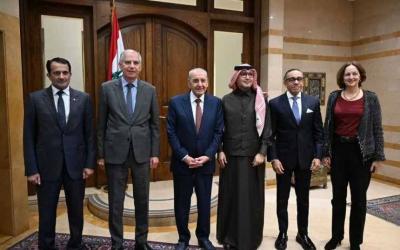The rapid developments in the region leave no room for discussions about the possibility of a breakthrough in the internal crisis. Recently, it was confirmed, among other information, that political forces have accepted the reality of a political drought, especially after the Israeli aggression on the Iranian consulate in Damascus, an event that political forces believe contributes to solidifying the current status quo amidst the anticipation of the Iranian response and what might result from it. Consequently, expectations of the activities of the ambassadors of the quintuple committee have significantly diminished; the committee members will continue their rounds with parliamentary bloc leaders after the holiday break.
The committee, composed of Saudi Walid Bukhari, American Lisa Johnson, French Hervé Magro, Egyptian Alaa Mousa, and Qatari Saud bin Abdul Rahman Al Thani, plans to hold meetings with National Liberal Trends leader Gebran Bassil, head of the Loyalty to the Resistance bloc Mohammad Ra’ad, Kataeb Party leader Sami Gemayel, and MP Tony Franjieh from the Marada Movement, in addition to the National Moderation bloc. Johnson and Bukhari, however, are expected to miss the meetings with Ra’ad and Bassil, as reported by "Al-Akhbar."
The paradox is the decline in expectations about the outcomes of this initiative, with a near-unanimous consensus on its inability to make a difference. Observers attribute this not only to internal divisions but also to issues within the committee itself. In recent meetings with several political forces, numerous signs of discord between the American and Saudi ambassadors emerged, starting with their first meeting with Parliament Speaker Nabih Berri in Ain al-Tineh. During that session, Berri indicated he would not oppose holding a dialogue without his presidency, to be led by the deputy speaker, prompting Johnson to describe the meeting as "excellent." However, Berri also pointed out that some political forces were fundamentally against the idea of dialogue, asking whether any friendly parties could intervene on their behalf, which the American ambassador interpreted as a reference to a negative Saudi role that some within Lebanon rely on to refuse dialogue.
This was further confirmed during the committee's visit to Maarab. Despite the quintuple members agreeing to arrive at the same time, Bukhari arrived an hour early, irritating the American ambassador who sensed an independent agenda from Bukhari concerning the committee's work. During the session, she questioned Lebanese Forces leader Samir Geagea about his rejection of the dialogue, which was perceived as her trying to convey a specific message to the Saudi ambassador.
In this context, informed sources on the committee's work say that its members are divided regarding their vision for a solution in Lebanon. While there is a pragmatic Emirati-Qatari understanding on approaching the Lebanese file, the French and Saudi interactions with political forces seem to be reactive. Paris believes that Lebanese officials have stymied its initiative, contributing to its marginalization and obstructing its efforts to secure a position in Lebanon, while Riyadh maintains its view that its investments in Lebanese affairs have been fruitless and yielded no benefit. The Egyptian stance appears to be negatively neutral, seemingly without a significant role.
However, the only recent development, according to sources, has been the beginning of a French-American thaw following U.S. Secretary of State Antony Blinken's talks in Paris and his meeting with his French counterpart Stéphane Séjourné on the need to prevent the expansion of conflict in Lebanon and to find a diplomatic solution, stressing the importance of coordination with France in this regard. Observers noted that the meeting aimed to reach an agreement on merging the French paper proposed by Séjourné for a ceasefire in the south with what is known as the incremental agreement for the implementation of UN Security Council Resolution 1701, presented by U.S. envoy Amos Hochstein. However, the same sources pointed out that all the initiatives currently taking place in Beirut will lead nowhere, as long as the strongest backer of any agreement—the U.S.—has not yet seriously engaged with the presidential election file and is focusing its attention on security issues in the south, according to "Al-Akhbar."




